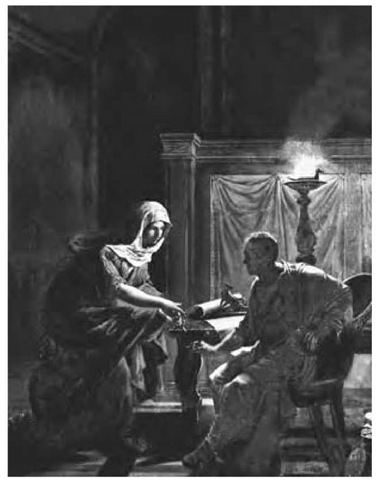Mark Antony’s wife, who played a direct role in military events. Fulvia was one of several women who played very active roles in the series of civil wars that ended the Roman Republic. As the wife of Mark Antony during the second triumvirate she was her husband’s most important agent in Italy, trying to halt the spreading authority of the rival triumvir Octavian (the future Augustus Caesar). Like Cleopatra VII of Egypt and unlike Octavian’s sister Octavia (both of whom later married Mark Antony), Fulvia played an active military role, even appearing on battlefields as her husband’s representative. Ful-via’s vilification by Roman historians shows both the triumph of Augustus’ propaganda and the deep repugnance felt by many Romans toward women who thus forgot their proper place.
Fulvia became politically active when married to her first husband, the radical politician Pub-lius Clodius, and after his assassination it was her pleas to the Roman mob that won condemnation of his murderers. Her second husband, Gaius Scribonius Curio, was also a politician. After Julius Caesar was assassinated (43 b.c.), Fulvia’s third husband, Caesar’s loyal supporter Mark Antony, became effective co-ruler of Rome alongside Caesar’s heir Octavian. The relationship between the two was soon strained, and Antony could count on the loyalty of few people outside his immediate family. Thus Fulvia was raised to an unofficial lieutenancy. Antony clearly trusted her; Cicero waspishly reports that Fulvia completely dominated her husband. Cicero was far from impartial because Fulvia had been responsible for his exile from Rome after he had defended the murderer of her first husband. Fulvia responded to Cicero’s barbed wit in kind. When Cicero was killed by Antony’s troops at the end of 43, his head was given to Fulvia and she celebrated by driving her hairpins through his tongue. Still, Cicero’s denunciations reveal how much Romans hated the notion of being commanded by a woman, or female public involvement in political affairs.
In 42 b.c. Antony went to the eastern part of the empire in a division of power with Octavian; he left Fulvia to look after his interests in Italy. As Octavian’s authority in Italy became more and more threatening, the pro-Antony faction responded—Lucius Antonius, Antony’s brother, stirred up a rebellion against Octavian. Although Fulvia opposed this policy as untimely, she rallied to the younger Antony. Fulvia raised troops and then tried to rally them for battle by appearing before them, along with her children by Antony. The ensuing Perusine War went badly; most of the Antonine troops refused to fight.
Fulvia, who contributed significantly to Roman politics as the wife of her third husband, Mark Antony.

